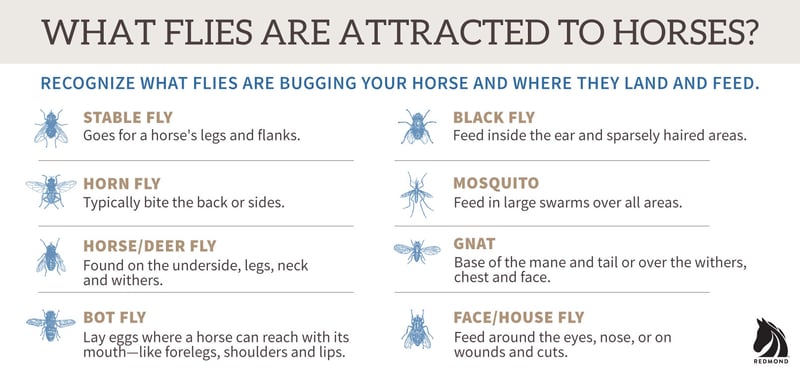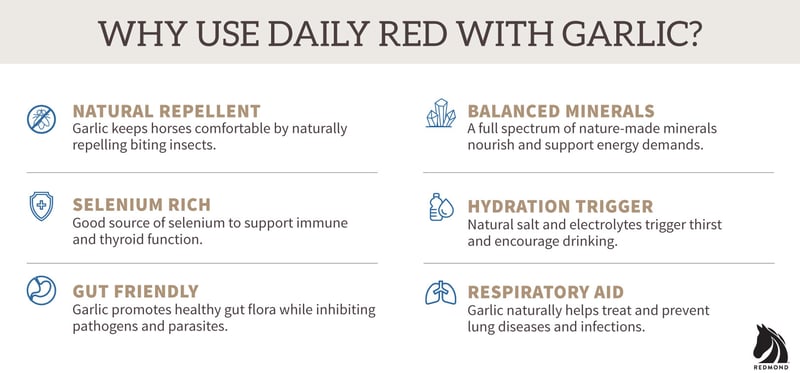6 Tips to Keep Pesky Flies Away From Horses
March 23, 2023
6 Tips to Keep Pesky Flies Away From Horses
No good horse owner likes seeing their horse harassed by flies. The swishing, swatting, and stomping can drive both a horse and rider to distraction. But flies on horses are more than annoying.
They bite, cause sores, deposit larvae and bacteria, and carry disease. They can also make your horse nervous and interrupt performance. That's why fly control around barns and stables and inhibiting flies from landing on your horse is essential.
Ready to take action to rid your horse of pests? You're in the right place! Let's cover the basics of when fly season starts, what (and why) flies are harmful to horses, and helpful ways you can protect your equine in the battle of the bugs.
Quick Content Guide
- Find out when fly season starts in your area.
- Be informed on what types of flies are attracted to horses.
- Learn what diseases horses get from flies.
- Get helpful tips to keep flies off your horse.
- Pick up a natural fly repellent supplement for horses.
When is Fly Season?
Flies don’t care that your calendar says spring starts three weeks into March. They will begin to surface, feed, and breed when it feels warm and comfortable enough to do so. The map below shows generic zones for when fly season begins and ends across the continental United States. Find your area to pin down when you need to be armed and ready for flies to attack.
As a proactive measure, acquire your preferred fly-fighting supplies sometime during the winter. Purchasing in advance will help you prepare if you experience an earlier-than-expected spring and outbreak. Once fly season is in full swing, plan for a battle that lasts well into the end of fall.
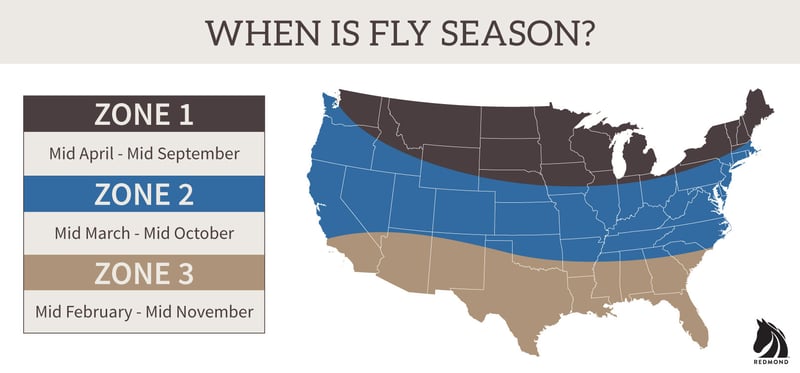
What Kinds of Flies Are Attracted to Horses?
Knowing the types of flies that land on horses, how they attack, and where they reproduce can help you decide on prevention and treatment methods to mitigate these pests. There are two main categories of flies: biting flies that feed on animal blood, and nonbiting flies that feed on bodily secretions. Other flies also lay eggs on horses. All are bad. And since the term “fly” is generic for any small, flying insect, that also includes gnats and mosquitoes.
Let’s take a closer look at the flies PennState Extension notes are most active in biting, bugging, and transmitting diseases in horses. Below you'll find a brief description of what each species looks like, where it lands, what it does, and how it spreads.
Stable Fly
- Small body, grayish-black color.
- Go for a horse's legs and flanks—ergo all that stomping. Has a painful bite that pierces the skin.
- Lays eggs in manure and urine, decaying vegetation, and contaminated hay or wet feed.
Horn Fly
- Very small body—just half the size of a house fly but similar in look.
- Typically found biting your horse's back or sides.
- Larvae develop in cow manure. If your horse isn't pastured with or near cows, horn flies probably aren't pestering your horse.
Horse Fly and Deer Fly
- Horse flies have large grayish-black bodies and green or purple eyes. Deer flies are smaller, with yellowish-orange and black bodies.
- Both pack a powerful and painful bite. Horse flies may also carry equine infectious anemia (EIA).
- Lay eggs in damp soil near streams, irrigation ditches, or lakes.
Black Fly
- Tiny, humpbacked body. These tormenters gather in large swarms around horses.
- Feed inside the ear and land on the head, neck, chest, and abdomen. Its bite can cause bleeding and itching.
- Larvae develop in fast-moving rivers and streams.
Gnat (biting midges or small flies)
- Very small, thin body. Yellowish, tan, or dark brown color.
- A painful bite; may cause "sweet-itch" at the base of the mane and tail or over the withers, chest, and face.
- Larvae develop around water, decaying vegetation, and manure.
Mosquito
- Slender body and long legs—you know the look. Grayish color.
- Feed on horses in large swarms and can produce surprisingly substantial blood loss.
- Reproduce around marshes, irrigated pastures—anywhere standing water exists.
Face Fly and House Fly
- Small body. Grayish-colored, with black stripes on the thorax.
- House and face flies are persistent pests that feed on the tear ducts of the eyes, around the nose, or on wounds and cuts.
- Breed in fresh animal manure.
Bot Fly
- Hairy, bumblebee appearance. Yellow face, metallic-colored body, and orange legs.
- Bot flies lay eggs on horses in areas they can reach with their mouth—like the forelegs, shoulders, and lips. The eggs hatch when the horse licks and rubs them. Once in the mouth, bots burrow into the gums and tongue and eventually enter the stomach. They detach in the spring and pass through the feces.
- Larvae pupate in manure; mature flies emerge, mate, and lay eggs to start the cycle over.
What Diseases Can Horses Get from Flies?
On the surface, flies and gnats can cause itching, hives, hair loss, skin thickening, abrasions, and ulcerations. Each of these conditions leaves your horse susceptible to bacteria and infection. While that's bad enough, the problems perpetuated by flies go more than skin deep. Here are some common diseases spread by flies (including gnats and mosquitoes) on horses:
- Summer sores: Nonhealing wounds caused by larvae from house, face, and stable flies.
- Pigeon fever: Bacterial infection deposited by flies on broken skin; causes large abscesses on a horse's chest or underbelly.
- West Nile Virus: Mosquito-borne virus that may cause neurologic disease.
- Equine Infectious Anemia: Serious blood-borne virus carried by horse flies. Symptoms vary from a slight fever to weakness, weight loss, or disorientation.
- Equine Encephalitis: Mosquito-borne disease that causes brain and spinal cord inflammation.
- Sweet Itch: An allergic condition triggered by gnat bites that cause mane/tail rubbing and damage to the skin along the upper neck, back, and tail base.
Watch the short video below with Dr. Jessica Huntington to get her take on biting insects, vector diseases, and natural fly control treatment.
6 Tips to Create a No-Fly Zone Around Your Horse
Even conscientious horse owners may sometimes feel like they're losing the battle of the bugs around stalls and barns. A fly infestation is frustrating for you and especially your horse—after all, it really only has a tail to use to drive away flies. The good news is you have quite a few more options to fight flies. The deterrents below either block, repel, or reduce insects and will improve fly control for your horses and barn this season.
1. Use a Quality Feed-Through
Feed-through fly control can be an effective means to reduce the overall fly population on your property. A horse feed-through is a larvicide—it kills larvae from flies or mosquitoes before they mature into adults. As the name suggests, a feed-through is an additive fed to horses in the form of pellets. The active ingredient mixes into the horse's manure through ingestion and digestion, stopping the development of larvae and future flies in manure.
While larvicides are not supposed to absorb into a horse's gastrointestinal tract, some owners may feel concerned about feeding this type of product. If you pick a feed-through as one of your fly control methods, make sure you're informed about the product and feel comfortable giving it to your horse. If you're looking for a feedable repellent that keeps flies off horses naturally, skip to the bottom of this article to learn about garlic for horse fly control.
2. Add Outer Fly Protection for Horses
Layering on protection from the outside helps block pests and keep your horse fly-free. You can get gear to protect them from head to hoof. There are mesh fly masks and boots, hoods, bonnets, veils, and fly sheets in various colors to suit your horse’s fashion style. Aside from picking your favorite print, we recommend choosing a material that’s comfortable for your horse, cool, and durable enough to last the season. This blog has more recommendations on choosing a fly sheet.
3. Repel with a Horse Fly Spray
A good fly spray is essential to have on hand in the barn, when traveling, and during those sweltering summer days when flies get out of control. These products repel insects and can be sprayed or wiped on, especially for application around the eyes. Horse fly sprays can last anywhere from several hours to several days, depending on the ingredients and if it’s oil- or water-based. To help you feel more informed about your choices, this University of Kentucky article lists popular brands of spray and wipe-on repellents, plus the active ingredient and concentration in each brand.
We believe natural is better for our equine friends, so always check ingredients and perhaps look for a spray containing essential oils or other natural repellants. If you choose a commercial spray, Pyranha fly spray for horses is a brand we like. Also, before covering your horse, test a small patch area to check for sensitivity or irritation to any product.
4. Set Out Fly Traps and Fans
From sticky tape to bug zappers, traps are a satisfying way to reduce the overall population of flies around your barn or property. Location, location, location is the key here.
If you’re using sticky traps, place them up high in barns or stalls where light and warmth reach and where your horse can’t. Using an odor trap? Place it at least 50 feet from your barn or paddock to ensure you lure flies away from your horse instead of drawing them in. Bug zappers or other visual attractants should be placed just outside of paddocks, fences, or stalls—close enough to be effective but far enough away that your horse can’t tamper with them. And for best results, set your traps out by mid-spring, before flies begin laying eggs and become a bigger problem.
For stalled horses in enclosed barns, adding a high-powered fan that points outward at entrances will also limit the number of pests getting in the door.
5. Use Biological Fly Control
You've heard of fighting fire with fire. Some companies offer a way to wage biological warfare on flies and reduce the overall population using parasites. Here's how it works: gnat-sized wasps (biteless and stingless) are released around your farm, stables, and pastures. The females seek out organic material like manure to deposit their eggs inside fly pupae. The eggs then hatch, feed on developing flies, and stop them from hatching. Since pest flies reproduce faster, fly predators need to be released every three to four weeks throughout fly season to remain viable. However, they're another safe and organic weapon in your fly-fighting arsenal.
6. Reduce Standing Water and Keep Your Horse’s Area Clean
While it means some extra work for you, keeping a tidy stall, paddock or barn helps reduce flies and can go a long way in keeping your horse comfortable. Getting rid of organic debris and managing water sources is one of the most effective ways to control flies.
Fresh manure is a breeding ground for flies. Removing it regularly—along with soiled or wet bedding and feed—will limit flies congregating and laying eggs in your horse’s space. Once you've removed the manure or organic material, disc or spread it out instead of heaping it in a pile. This breaks it up, dries it out, and makes it far less habitable for pests.
Also, make sure your horse’s water is clean and fresh. Any stagnant or smelly water will attract gnats, mosquitoes, and certain types of flies—none of which you want moving in with your horse. Tip over or get rid of containers that collect water. If you can't remove standing water from an area, adding minnows to small ponds or your horse's trough is a natural way to inhibit mosquito breeding. Larvicides with the bacterium Bacillus thuringiensis israelensis (Bti) or the insect growth regulator methoprene can also be added to ponds to kill larvae and is considered safe for livestock.
What to Feed Horses to Repel Flies
Wondering how to keep flies off horses naturally? Besides external fly-fighting measures around your horse and barn, many horse owners also want to know what to feed horses to keep flies away.
Did you know garlic is one of the best and most natural horse fly repellents? Proponents have argued for years that it reduces flies on livestock—now there are numbers to prove it. In 2017, researchers in Saskatchewan determined cows fed with a trace mineral salt fortified with garlic had 52% fewer flies than control groups that received trace mineral salt alone. Feeding horses garlic also helps with flies!
Best Natural Fly Repellent for Horses
Daily Red Crushed Garlic and Daily Red Fortified Garlic are smart natural fly supplements for horses. Both begin with a foundation of Redmond mineral salt and bioidentical garlic oil—the most bioactive, stable, and potent form of garlic. They deliver balanced minerals your horse needs for optimum nutrition and hydration.
Daily Red garlic products are "sweat-through" repellents that offer your horse protection from the inside out. As a horse consumes the mineral salt, garlic is absorbed into the bloodstream and sweat out through pores to repel flies, ticks, and other insects. Here is a testimonial from customer Staci M. Fife:
"I've been feeding Crushed Garlic for two weeks. All three eat it with no issues, and best of all, I don't see any new welts, bumps, or itchy spots on my sensitive-skinned filly. Her eyes are less watery, and she seems so much more comfortable, with way less fly spray, and not bundled in a fly sheet in 100-degree weather."
Give your horse a delicious mineral supplement and fly repellent that works! Daily Red Garlic supplements will provide your horse valuable health benefits and help them experience fewer flies and feel more comfortable. Click below to try it today!
Learn More
- Can you feed garlic year-round? Find out how much garlic is safe to feed horses.
- Not all garlic supplements are equal. Learn which forms of garlic are most effective for horses.
© Redmond Equine 2023. All rights reserved.
Related posts
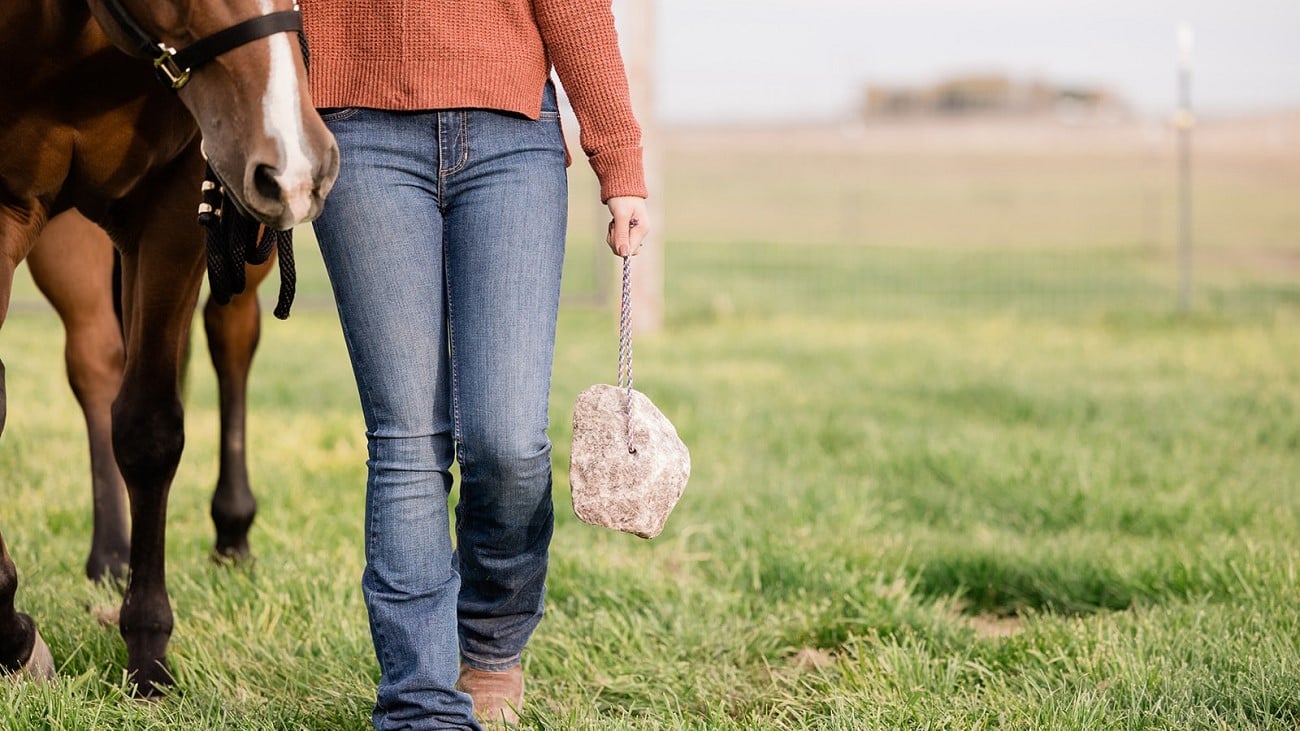
The Seasons Change — So Should Your Horse's Minerals!
A loose mineral salt for horses is needed year-round. Learn which horse mineral to feed each season, including a fly control mineral for horses in...
December 18, 2024
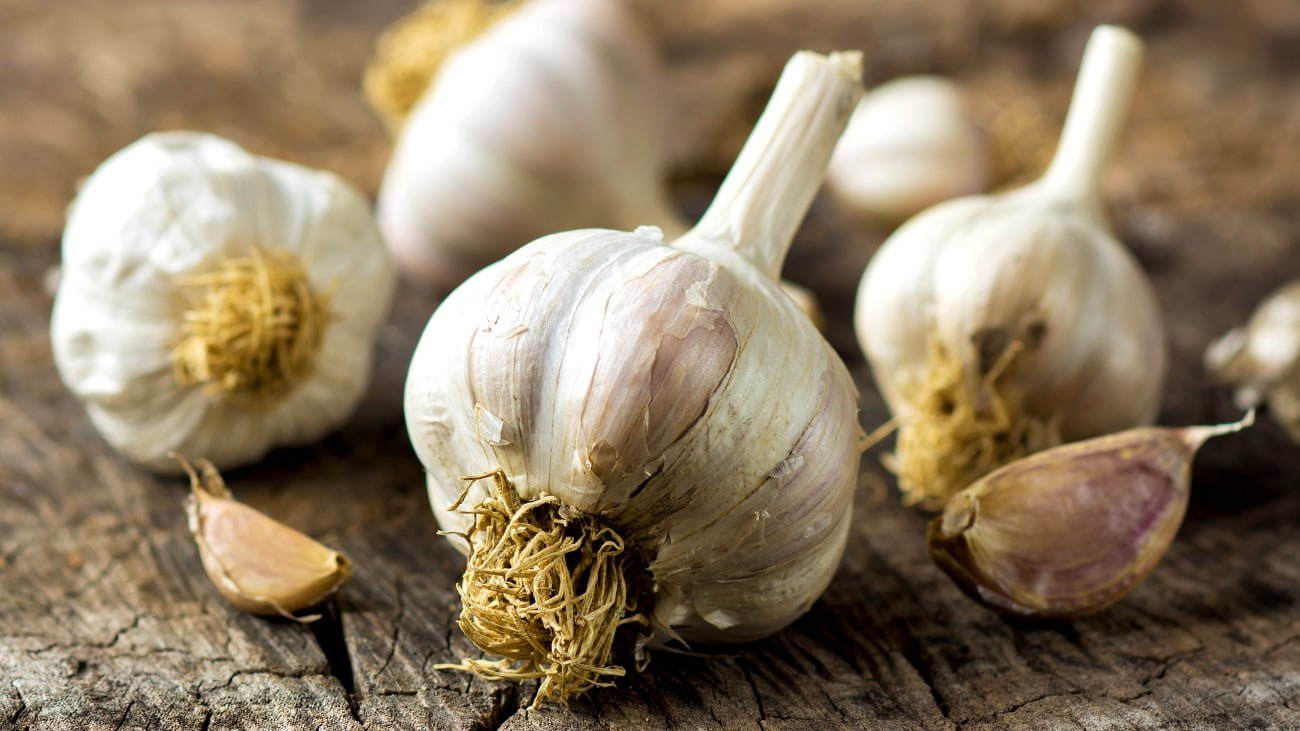
Do You Know How Much Garlic To Feed Horses?
Garlic has many health benefits for horses, but do you know how much garlic to feed horses? Get the right amount with Redmond Rock Crushed with...



